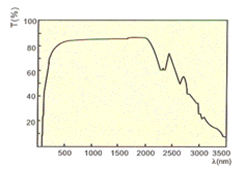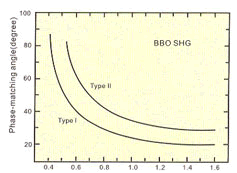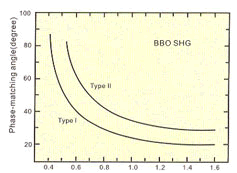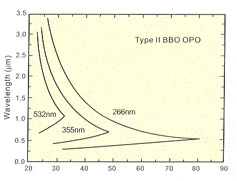|
Main features are:
� Broad
phase-matchable range from 409.6 nm to 3500nm;
� Wide
transmission region from 190 nm to 3500nm;
� Large
effective second-harmonic-generation (SHG) coefficient about 6 times
greater than that of KDP crystal;
� High
damage threshold of 10GW/cm2 for 100ps pulse-width at 1064nm;
� High
optical homogeneity with δn≈10-6/cm;
� Wide
temperature-bandwidth of about 55℃.

We offer:
� Strict
quality control;
� Crystal
length from 0.02mm to 25mm and size up to 15x15x15 mm3;
� P-coatings,
AR-coatings, mounts and re-polishing services;
� A
large quantity of crystals in stock
� Fast
delivery (10 days for polished only,15 days for AR-coated).
Basic Properties
Table 1.Chemical and Structural properties
|
Crystal Structure: |
Trigonal, space group R3c |
|
Lattics Parameters: |
a=b=12.532�, c=12.717�, Z=6 |
|
Melting point |
About 1095℃ |
|
Mohs Hardness |
4 |
|
Density |
3.85g/cm3 |
|
Thermal Conductivity |
1.2W/m/K(┴c): 1.6w/m/K(//c) |
|
Thermal Expansion Coefficients |
α,4x10-6/K; c,36x10-6/K |
|
Transparency Range: |
190-3500nm |
|
SHG Phase Matchable Range |
409.6-3500nm(Type I) 525-3500nm(Type II) |
|
therm-optic Coefficients(/℃) |
dno/dT=-9.3x 10-6/℃
dne/dT=-16.6x 10-6/℃
|
|
Absorption Coefficients |
<0.1%/cm at 1064nm <1%/cm at 532nm |
|
Angle Acceptance |
0.8mrad-cm (θ, Type I,1064 SHG)
1.27mrad-cm (θ, Type II,1064 SHG) |
|
Temperature Acceptance |
55℃-cm |
|
Spectral Acceptance |
1.1nm-cm |
|
Walk-off Angle |
2.7� (Type I 1064 SHG)
3.2� (Type II 1064 SHG) |
|
NLO Coefficients |
deff (I)=d31sinθ+(d11cosΦ-d22sin3Φ)cosθ
deff (II)=(d11sin3Φ+d22cos3Φ)cos2θ |
|
Non-vanished NLO susceptibilities |
d11=5.8xd36(KDP)
d31=0.05xd11
d22<0.05xd11 |
|
sellmeier Equations(λ in μm ) |
no2=2.7359+0.01878 / (λ2-0.01822)
-0.01354 λ2
ne2=2.3753+0.01224 / (λ2-0.01667)
-0.01516 λ2 |
|
Electro-optic coefficients: |
r11=2.7pm/V, r22, r
31<0.1γ11 |
|
Half-wave voltage: |
7KV (at 1064nm,3*3*20mm3) |
|
Resistivity: |
>1011 ohm-cm |
|
Relative Dielectric Constant: |
εs11/εo:6.7
εs33/εo:8.1
Tan δ<0.001 |
BBO is a negative uniaxial crystal,with ordinary
refractive-index(no) larger than extraordinary refractive-index(ne).Both
type I and type II phase-matching can be reached by angle-tuning.The
phase matching angles of frequency doubling are shown in Fig.2.
|
 |
 |
|
Figure 1.Transparency curve of BBO |
Figure 2.SHG tuning curves of BBO
|
Application in Nd:YAG Lasers
BBO is an efficient NLO cyrstal for the second, third and
fourth harmonic generation of Nd:YAG lasers,and the best NLO crystal for
the fifth harmonic generation at 213nm. Conversion efficiencies of more
than 70% for SHG,60% for THG and 50% for 4HG,and 200mW output at 213
nm(5HG)have been obtained,respectively.
BBO is also an efficient crystal for the intracavity SHG
of high power Nd:YAG lasers. For the intracavity SHG of an acousto-optic
Q-switched Nd:YAG laser, more than 15 W average power at 532 nm was
generated in a AR-coated BBO crystal. When pumped by the 600 mW SHG
output of a mode-locked Nd:YLF laser, 66 mW output at 266 nm was
produced from a Brewster-angle-cut BBO in an external enhanced resonant
cavity.
Because of a small acceptance angle and large walk-off,
good laser beam quality (small divergence, good mode condition,etc.) is
the key for BBO to obtain high conversion efficiency. Tight focus of
laser beam is not recommended by our engineers.
Applications in Tunable Lasers
1. Dye lasers
Efficient UV output (205nm-310nm) with a SHG efficiency of over 10% at
wavelength of ≥206nm was obtained in type I BBO, and 36% conversion
efficiency was achieved for a XeC1-laser pumped Dye laser with power
150KW which is about 4-6 times higher than that in ADP. The shortest SHG
wavelength of 204.97 nm with efficiency of about 1% has been generated.
Our BBO is widely used in the Dye lasers. With type I
sum-frequency of 780-950 nm and 248.5 nm (SHG output of 495 nm dye
laser) in BBO, the shortest UV outputs ranging from 188.9nm to 197 nm
and the pulse energy of 95 mJ at 193 nm and 8 mJ at 189 nm have been
obtained, respectively.
2.Ultrafast Pulse Laser
Frequency-doubling and -tripling of ultrashort-pulse lasers are the
applications in which BBO shows superior properties to KDP and ADP
crystals. Now, we can provide as thin as 0.02mm BBO for this purpose. A
laser pulse as short as 10 fs can be efficiently frequency-doubled with
a thin BBO, in terms of both phase-velocity and group-velocity matching.
3.Ti:Sapphire and Alexandrite lasers
UV output in the region 360nm -390nm with pulse energy of 105 mJ(31% SHG
efficiency) at 378 nm, and output in the region 244nm-259nm with 7.5
mJ(24% mixing efficiency) have been obtained for type I SHG and THG of
an Alexandrite laser in BBO crystal.
More than 50% of SHG conversion efficiency in a Ti:Sapphire laser has
been obtained. High conversion efficienies have been also obtained for
the THG and FHG of Ti:Sapphire lasers.
4. Argon Ion and Copper-Vapor lasers
By employing the intracavit frequency-doubling technique in an Argon Ion
laser with all lines output power of 2W, maximum 33 mW at 250.4 nm and
thirty-six lines of deep UV wavelengths ranging from 228.9 nm to 257.2
nm were generated in a Brewster-angle-cut BBO crystal.
Up to 230 mW average power in the UV at 255.3 nm with maximum 8.9%
conversion efficiency was achieved for the SHG of a Copper-Vapor laser
at 510.6 nm.
BBO�s OPO and OPA
The OPO and OPA of BBO are powerful tools for generating
a widely tunable coherent radiation from the UV to IR. The tuning angles
of type I and type II BBO OPO and OPA have been calculated, with the
results shown in Fig.5 and Fig.6, respectively.
1.OPO pumped at 532 nm
an OPO output ranging from 680 nm to 2400 nm with the
peak power of 1.6MW and up to 30% energy conversion efficiency was
obtained in a 7.2 mm long type I BBO. The input pump energy was 40 mJ at
532nm with pulse-width 75ps. With a longer crystal, higher conversion
efficiency is expected.
2.OPO and OPA pumped at 355 nm
In the case of Nd:YAG pumping,BBO�s OPOs can generate
more than 100mJ,with wavelength tunable from 400nm to 2000nm. Using our
BBO crystal, the OPO system covers a tuning range from 400nm to 3100nm
which guarantees a maximum of 30% and more than 18% conversion
efficiency, over the wavelength range from 430nm to 2000nm.
Type II BBO can be used to decrease linewidth near the degenerate
points. A linewidth as narrow as 0.05nm and usable conversion efficiency
of 12% were obtained. However, a longer (>15mm) BBO should normally be
used to decrease the oscillation threshold when employing the type II
phase-matching scheme.
Pumping with a picosecond Nd:YAG at 355nm, a narrow-band(<0.3nm), high
energy (>200μJ) and wide tunable (400nm to 2000nm) pulse has been
produced by BBO�s OPAs. This OPA can reach as high as more than 50%
conversion efficiency, and therefore is superior to common Dye lasers in
many respects, including efficiency, tunable range, maintenance, and
easiness in design and operation. Furthermore, coherent radiation from
205 nm to 3500 nm can be also generated by BBO�s OPO or OPA plus a BBO
for SHG.
|
 |
 |
|
Figure3.Type I OPO turning curves of BBO |
Figure4,Type Ii OPO tuning curves of BBO |
3.Others
A tunable OPO with signal wavelengths between 422 nm and 477 nm has been
generated by angle tuning in a type I BBO crystal pumped by the fourth
harmonic of a Nd:YAG laser (at 266 nm) has been observed to cover the
whole range of output wavelengths 330 nm -1370nm.
When pumped by a 1mJ, 80fs Dye laser at 615 nm,the OPA with two BBO
crystals yields more than 50μJ (maximum 130μJ),<200fs ultrashort pulse,
over 800 nm-2000 nm.
BBO`s E-O Applications
BBO can also be used for E-O applications. It has wide
transmission range from UV to about 3500nm and it has much higher damage
threshold than KD*P or LiNbO3, More than 80W output power and
50KHZ repitition rate have been reached by using our E-O BBO crystals
and Nd:YVO4 crystals as gain media. At 5K Hz, its pulse has
width as short as 6.4ns,and energy of 5.7mJ or peak power of 900 KW.It
has advantages over the commercial A-O Q-switched one , including a very
short pulse,high beam quality and size compact as well. Although it has
a relative small electro-optic coefficient,the Half-wave voltage is high
(7KV at 1064nm,3*3*20mm3),long and thin BBO can reduce the voltage
requirements. We now can supply 25mm long and 1mm thin high optica
quality of BBO crystal with Z-cut, AR-coated and Gold/Chrome plated on
the side faces.
Coatings
We provide the following AR-coatings for BBO:
-
Dual
Band AR-coating (DBAR)of BBO for SHG of 1064nm
1. low reflectance (R<0.2% at 1064nm and R<0.5% at 532nm);
2. high damage threshold (>300MW/cm2 at both
wqvelengths);
3. long durability;
-
Broad
Band AR-coating (BBAR) of BBO for SHG of tunable lasers.
-
Broad
Band P-coating of BBO for OPO applications.
-
Other
coatings are available upon request.
Warranty on BBO Specifications
-
Dimension tolerance:
(W�0.1mm)x(H�0.1mm)x(L+0.5/-0.1mm) (L≥22.2.5mm)
(W�0.1mm)x(H�0.1mm)x(L+0.1/-0.1mm) (L<2.5mm)
-
Clear
aperture :central 90% or the diameter
-
No
visible scattering paths or centers when inspected by a 50mW green
Laser
-
Flatness: less than λ/8 @ 633nm
-
Transmitting wavefront distortion: less than λ/8 @ 633nm
-
Chamfer: ≤0.2mm@45�
-
Chip:
≤0.1mm
-
Scratch/Dig code: better than 10/5 to MIL-O-13830A
-
Parallelism: ≤20 arc seconds
-
Perpendicularity:≤5 arc minutes
-
Angle
tolerance:≤0.25�, ≤0.25�
-
Damage
threshold{GW/cm}:
>1for1064nm,TEM00,10ns,10HZ (polished only),
>0.5 for 1064nm,TEM00,10ns,10HZ(AR-coated) ;
>0.3 for 532nm,TEM00,10ns,10HZ(AR-coatd)
Note
-
BBO has
a low susceptibility to the moisture. The user is advised to provide
dry conditions for both the use and preservation of BBO.
-
BBO is
relatively soft and therefore requires precautions to protect its
polished surfaces.
-
When
angle adjusting is necessary, keep in mind that the acceptance angle
of BBO is small.
-
Our
engineers can select and design the best crystal, if the main
parameters of your laser are provided, such as energy per pulse,
pulse width and repetition rate for a pulsed laser, power for a cw
laser, laser beam diameter, mode condition, divergence, wavelength
tuning range, etc.
|
